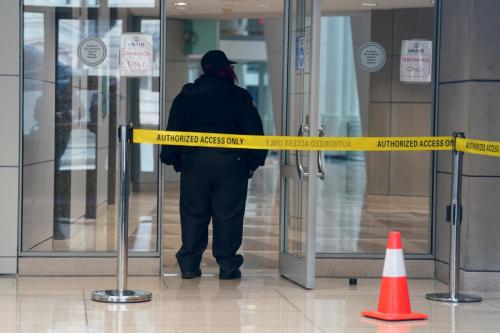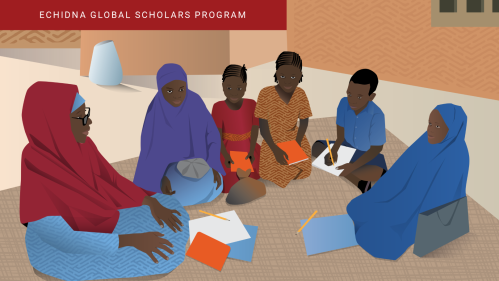Editor’s Note: The original version of this piece, written in Arabic, can be found on the Asharq Al Awsat website.
In New York, this week, alongside the global gathering of the U.N. General Assembly, one meeting holds special resonance for the Arab world and its corporations, in particular. On September 23, Gordon Brown, the U.N. global education envoy, rallied support for a new plan to address the most overlooked element of the humanitarian crisis caused by the war in Syria—education.
The case for corporate investment in education has always been strong. The urgency, however, to help transform the shattered lives of hundreds of thousands of refugee children through education is a moral imperative. It can also be an opportunity for corporate community investments to be at once responsive, results-driven and aligned with national aid commitments.
Education is a top priority for refugees. “Education for my children is more important than anything else,” said one Syrian mother last week, echoing the sentiment of over 100 parents interviewed inside Syria and in refugee camps during what should have been back-to-school week. The U.N. reports families moving from one location to another in search of a school that might have space for their children. Education for these families is not only about learning to read and write. It is about bringing back some measure of normalcy to their upturned lives. It provides much needed protection for their children who would otherwise be roaming around in dangerous surroundings. Through schooling, counselors can work with children to begin to address their traumas and lay the foundation for healing.
Going to school does not only represent hope in the immediate term, it is also a critical investment in every refugee child’s future. It begins to address what is becoming a long- term development issue for Syria and the region, as the conflict extends into its third year and the prospects for returning to school for many children diminish.
A UNESCO report, released in July of this year, underscored the impact of ongoing conflicts in the region on education. 4 million children were out of primary school in conflict-affected Arab states. This represented approximately 84 percent of the out-of-school children in the Arab world. With the massive addition of the out-of-school Syrian children, the region is quickly heading towards its biggest education crisis to date.
Yet, the aid allocations for education have fallen far short of the need. According to Education Without Borders, a new report by the head of the Overseas Development Institute, Kevin Watkins, some 270,000 children in Lebanon alone are estimated to be out of school. The situation is exacerbated by the fact that the Lebanese government has received very little funding for refugees. “If Syria’s refugee children were a country, they would have the world’s lowest enrolment rates for both primary and secondary education. Palestinian children face equally desperate prospects. One report from UNRWA documents that only around one-third of children displaced from Palestinian camps in Syria were enrolled in school at the end of the 2013 academic year,” wrote Watkins.
Despite the Lebanese government’s effort to accommodate refugee children, without more financial and delivery support, they risk shattering their already stretched education system. In 2012, 980 public schools accepted around 30,000 Syrian children at the primary level. That is 20 percent of the existing school population. With current estimates suggesting an increase to 409,000 school-age children, the public education system would be forced to double its students in the space of one year. This is simply not plausible, warns Watkins.
Existing efforts by regional governments and non-profit organizations from countries such as the UAE and Qatar have been essential to delivering basic humanitarian needs to Syrian refugees. Recognizing the importance of education, some of that aid has been spent on education but much more is needed.
Gordon Brown is proposing a three-year, $500 million plan to get all school-age refugees from Syria (Syrian and Palestinian) in Lebanon into school. The plan aims to build the capacity of the strained Lebanese public education system, as well as support several national and international NGOs, ready to scale up high quality programs. Led by UNICEF, key strategies include: expanding double shifting across the education system; rehabilitating sub-standard premises; recruiting new teachers; covering registration costs; and providing essential learning and psycho-social support for children. It will secure schooling for the 300,000 children already in Lebanon and prepare to absorb another 200,000 as the flows of refugees increase. It also includes approximately $100 million to cover prohibitive transportation costs and school meals.
The bottom line is the goal is within reach. At a cost of $400-600 per student, the international community can and should save the future of a would-be lost generation.
There are at least five reasons why companies in the region should heed the call:
- Today’s children are tomorrow’s workforce. Companies understand the importance of education; they invest heavily in training and education of their employees, and increasingly in schools and other community education programs that ensure the foundation of an educated and skilled workforce and informed society. These are understood as essential long-term investments. Making sure these Syrian children actually get to go to school is the absolute base of this foundation.
- Companies thrive in stable, healthy societies. Companies in the region have an urgent stake in investing effectively to increase stability. For these Syrian children, at the very minimum, getting into school is the difference between some semblance of hope and stability, and utter despair. Companies and institutions vividly understand the consequences to long-term regional stability if these children suffer in despair without even the basic right to an education.
- Companies seek results and value for money. Companies invest and manage for tangible results. There are very few corporate community investment programs in the Arab region that can claim better impact than a $400-600 investment to put a conflict-stricken, displaced child in school for a year. Every company considering this investment can make a direct comparison of the impact per dollar invested in this program vs. typical initiatives and arrive at an overwhelmingly compelling conclusion.
- Companies seek alignment and leveraging of resources. Companies enter into this project in a collaboration that draws on the resources and expertise of organizations from around the world. It is a chance to contribute to, and learn from, effective partnerships with a large-scale impact, which in turn could be applied to other major regional challenges. Furthermore, it is a chance to align and support the spending commitments of regional governments on education for these refugees, while simultaneously sending the message of the importance for those governments to invest more.
- The best companies seek to do the right thing. Above and beyond the convincing business case, the moral imperative of this humanitarian crisis demands action. CEOs of the best companies in the region understand their companies to be indivisible from the societies they are in. A society’s anguish is everyone’s responsibility. These CEOs find strength, energy and wisdom—for themselves and their corporations—simply by doing the right thing in the time of greatest need.
Which corporations will heed the call? Which corporations will help to heal a generation?
The Brookings Institution is committed to quality, independence, and impact.
We are supported by a diverse array of funders. In line with our values and policies, each Brookings publication represents the sole views of its author(s).




Commentary
Getting Syrian Children Back to School: A Corporate Imperative
September 26, 2013